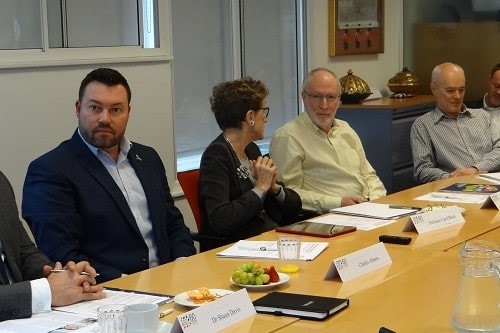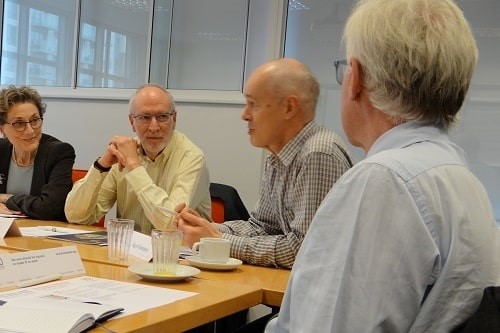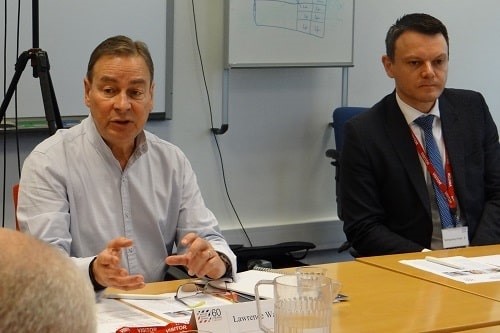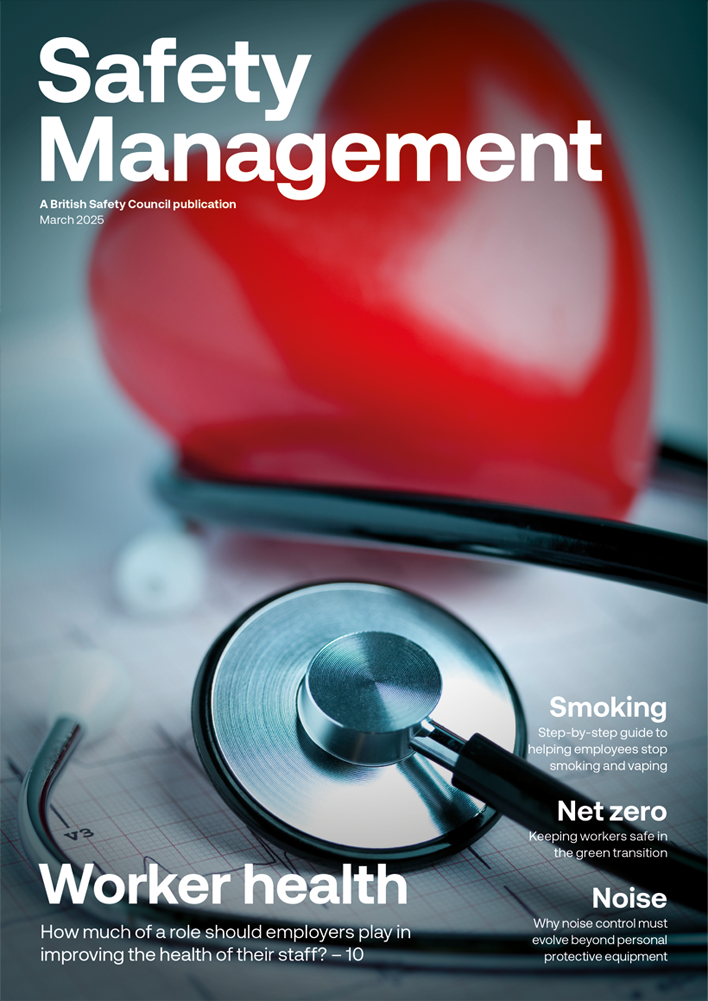Some of Britain’s most eminent thought leaders and campaigners took part in the British Safety Council’s roundtable debate on workplace wellbeing held in March. They examined and challenged wellbeing concepts and practices.
Features
Redefining workplace wellbeing – Part II
The debate was chaired by Peter McGettrick, board member of the British Safety Council, and hosted by Lawrence Waterman, chair of the British Safety Council. The panel included: Professor Dame Carol Black, Sir Professor Cary Cooper; Norman Lamb MP; Charles Alberts, head of health management at Aon; Peter Brown, deputy director of the health and work programme at HSE; Dr Shaun Davis, global director of safety, health, wellbeing and sustainability at Royal Mail; Steve Hails, director of health, safety and wellbeing at Tideway; James Murray, managing director of Healthy Workplace, Vitality; and Hugh Robertson, senior policy officer at TUC.
The first part of the report from the debate was published in the May edition of Safety Management and is available to view here. The second part continues below. You can also watch it via our YouTube channel here
Managing workplace wellbeing
Peter McG: What sort of leadership support is there for managing workplace wellbeing?
Steve: Most organisations we deal with haven’t got that. Sadly, you have to justify it. It would be wonderful if senior management believed that bringing in a wellbeing programme was the right thing to do for your employees.
Peter McG: What about line management?
Steve: It’s very much the same but again, training is not the issue. We’ve been doing this in safety terms for years and you still find rogue line managers who act in an inappropriate manner where safety’s concerned. I would imagine it’s even worse regarding health and wellbeing. Training is important but it must come with support mechanisms. I think we need to go back to the fundamentals: how do you become a line manager?
I think we’re being disrespectful to individuals by putting them in managerial positions without equipping them with the skill set to do the job properly. Companies are failing their staff by granting managerial responsibility to people on the basis of their technical ability, with no thought being given to providing them with the training or support to allow them to succeed as leaders. In the armed forces you would never progress into that role until you could demonstrate that you can lead.
 Leaders in their fields met at the British Safety Council’s roundtable on 20 March to discuss wellbeing in the workplace.
Leaders in their fields met at the British Safety Council’s roundtable on 20 March to discuss wellbeing in the workplace.
Cary: Steve’s right on. Two and half years ago I formed the National Forum for Health and Wellbeing, which now involves 37 major employers, including Shell, Rolls-Royce, NHS England, BP, Marks & Spencer, Barclays, John Lewis Partnership, and CIPD. We meet quarterly and we select an issue for discussion. Given that I’m an academic, I bring in an expert to review the evidence. I asked the Forum what their key issues are in relation to workplace wellbeing. The first one was good line managers. Unless we get that right, wellbeing is dead. Line managers mean everybody from the shop floor all the way up.
The second issue was techno-stress. People’s private lives are profoundly affected by work-related stress. Under French law no manager can send an email out of office hours to their subordinates. That’s the work-life balance thing. I don’t support that because we prefer to work flexibly. However, employers want to be able to control flexible working. The third issue was the impact of a multigenerational workforce on health and wellbeing.
Carol: I am also familiar with the work of German researcher Nicholas Bowen, who worked with 1,500 line managers in medium-size and small companies. He looked at their mental and physical health using self-reporting questionnaires, with all the caveats. Then he looked at the health of the people whom they managed and concluded that the workers managed by people with poor psychological and physical health had the worst health. This shows that the line manager’s health and wellbeing is crucially important to the health of the people under them.
Cary: The promotion of people on the basis of their technical competence is one of the reasons why our productivity per capita is so poor. If we did an audit of our managerial staff from shop floor to top floor, around 20 per cent of them would prove to be very skilled technically but should never be left alone near people and are untrainable. Around 50 per cent need training and some 20 or 30 per cent have natural people skills.
 Hugh Robertson: "Nowadays a line manager is a personnel officer, a welfare officer and a technical officer all rolled into one"
Hugh Robertson: "Nowadays a line manager is a personnel officer, a welfare officer and a technical officer all rolled into one"
Steve: Let’s make sure we don’t fall into the age-old problem of identifying the gap and then trying to close it by giving training. For example, you’re a line manager and you’re sent on a five-day health and wellbeing programme. Now it’s assumed that you are qualified to deal with these issues. Just like that. Everyone around this table is in a senior position and we know how much coaching, mentoring and leadership training we have received to be the leaders in our respective businesses. Companies train their executive teams, their boards and their senior managers. They coach and mentor them, but they never put that same investment into those who will give them the biggest return, i.e. line managers.
Hugh: I think part of the problem is the understanding of what line management is supposed to be. All the old foreman needed was technical skills. Nowadays a line manager is a personnel officer, a welfare officer and a technical officer all rolled into one. It’s because organisations are passing the buck.
Lawrence: Indeed. Training often produces a layer of people who know what good practice looks like and what they ought to be doing but they have no power, no authority, no support mechanism to exercise it. All you do is increase their stress because they feel guilty as well as not being able to make a difference.
This takes us back to voice, culture and organisational structure. It would be better if we had less competent health and safety managers but with tremendous commitment and access to brilliant advice and the ability to act on it. What people need to know is: what the issues are and how to get the advice and support they need. If you transfer them into a place where they can’t make a difference, training them doesn’t achieve anything.
Peter B: The definition of competence is knowing when you’re not competent.
Charles: In this context, I would like to comment on work-related stress. The latest statistics from the Health and Safety Executive show that this is increasing. This year, more people suffered from work-related stress, depression and anxiety than last year and more than the year before. In terms of the causes, 44 per cent relates to workload, followed by job insecurity and change in the organisation. From a workload perspective, the line manager holds the key. They are the individuals on whom we need to focus, but we are not doing enough to train them adequately.
Carol: It’s within the manager’s capabilities to do [as Lawrence has said], but how do you achieve that?
Peter B: The workload is an issue which the health system should examine on a tier basis. The primary focus should be on job design and how stress can be taken out or minimised in the first place. The secondary tier would be support systems, ensuring that the training and access to help is provided. Only then should we be looking at the third tier – salad bars, exercise classes, etc. If we don’t get that primary level of interventions right in the first place, we are running the risk of getting the other things wrong. I think we should approach wellbeing level by level, starting from primary, secondary, tertiary...
Measuring the impact of wellbeing interventions
Peter McG: How do we assess or measure the impact of wellbeing interventions in the workplace?
James: There are many tools to do this. The problem is with the will and the commitment, or rather the lack of it. That’s why we talk about workplace engagement, culture and leadership in the context of wellbeing. Where we see bad working practices, we look for accountability for it and how that dynamic is managed. Is this addressed or condoned? In some business environments, people just get on with it.
Shaun: In my opinion, the best tool for measurement is the whites of the eyes test: looking at someone and having a conversation with them on the shop floor, asking: “What do you think about this issue from your perspective? Do you know how to access employee assistance programmes?” This is how you know whether a given measure is right for that person. If you rely solely on KPIs, board reports and accounts, you are only ever seeing half of the picture.
 Lawrence Waterman: "Without a culture of openness and honesty, you’ll get the nodding dog routine, everything’s fine, everything’s fine."
Lawrence Waterman: "Without a culture of openness and honesty, you’ll get the nodding dog routine, everything’s fine, everything’s fine."
Lawrence: You’re coming from quite a mature perspective and an organisation that created an environment in which people feel comfortable to be open and honest. Without that what you’ll get is the nodding dog routine, everything’s fine, everything’s fine. Only if you create a trusting environment can you expect tangible actions to come from an annual survey, as well as honest feedback.
Hugh: I’ve never seen a monitoring tool I’ve got any confidence in. Before you have a monitoring tool you need to determine what a successful outcome is and that’s what is missing from most of them. Most wellbeing initiatives are groups of interventions and their success is measured by issues such as productivity or sickness absence. Well, they’re not outcomes in terms of wellbeing. You can’t determine wellbeing until you’ve defined what it is and how you’re going to measure it.
Cary: There are a number of good measuring tools. The HSE has one and so does Vitality. The problem is: once you get the data, what do you do with it? For example, when I carried out some research on behalf of a county council which was experiencing a real problem and was being sued by its employees, we audited the whole organisation and presented the results to them. We asked them to propose solutions. We would never have thought about the solutions they suggested, but we costed it. That is how we used the process and tools.
Hugh: I think you’re wrong about the tools. They can determine some of the impacts, but they won’t provide an explanation as to why we have used them in the first place. Each indicator should, first of all, look at the organisation and what it’s trying to achieve.
Challenges and opportunities
Peter McG: How are modern life and technology affecting the workplace?
Cary: At the National Forum for Health and Wellbeing this was the second key issue. It’s called techno-stress and French companies deal with it in a very decisive way. For example, Volkswagen blocks emails at 5 o’clock, while Daimler closes down their employee email system during their holiday times. I don’t support this because I believe in flexible working.
I don’t think we need heavy guidelines but we need some guidance. I asked 37 members of the Forum how many of them have guidelines on the use of emails. Only one manager raised his hand.
Peter: I don’t agree with the approach of Germany and France but I think the intent is right. People should be able to switch off and separate their work from their personal life.
Steve: We should avoid bringing draconian measures into work that could switch off millennials who use email and text to communicate. For example, the easiest way to get my daughter down for dinner is to text her, rather than go upstairs and knock on the door, turn the music down and ask her to come down.
Hugh: Let’s not forget about the many positive things associated with email. In certain jobs it gives people more control. It also provides records – email trails of previous conversations – which save a lot time and effort. However, among the things that annoy people about email are the expectation of immediate response and being copied into everything.
Charles: There’s nothing inherently evil or good about technology. The issue is how it’s managed. It takes us back to the concept of culture. I believe in flexibility and allowing people to fit their work around their lives. However, if a line manager is sending emails at 9pm or 11pm, he sets a tone for his team and the team feels that the same might be expected of them. That’s why we need organisational guidance around this.
Peter McG: Does the same thing apply to presenteeism?
Shaun: We still have a lot of work to do on what presenteeism means, what we can do to influence it and what we should do to encourage a culture where people feel free to disclose things.
 Cary Cooper: "The problem is we don’t have many line managers with a high level of emotional intelligence"
Cary Cooper: "The problem is we don’t have many line managers with a high level of emotional intelligence"
Steve: We need to be careful that we don’t become obsessed with measuring things, and just getting figures that we want to show to the board...
Shaun: If we invested in our line managers so that they were able to understand their teams, what makes them tick and what makes them be the very best they can be on a daily basis, they would be able to support the people working for them.
Cary: The problem is we don’t have many line managers with a high level of emotional intelligence. Presenteeism is about several things, including sickness presenteeism. People are coming to work ill because they’re frightened of not going in and having that absence on their records. A good line manager would say: ‘Kerry, go home, you’re not well.’
Hugh: Do line managers have the breathing space and the opportunity to look after a team of nine or ten people? We spoke about people being promoted on the basis of their technical ability. Many line managers still carry some of that responsibility with them.
Lawrence: You have to give them that breathing space. That’s part of the support they need.
Carol: It has to be a long-term support if they’re going to do a good job.
Cary: You should help them develop their social and interpersonal skills. The problem is that we don’t do this at business schools. We don’t train people to manage other people. We train them to expand their knowledge but we don’t train them to change their behaviour.
Carol: You need to change what you’re teaching.
Cary: In fact, we’re trying to get a group of business schools together to do that, to think about how we should train MBA students to manage people.
Lawrence: On London 2012, we ran a leadership programme for supervisors. At the end of the training course they were given a contract which said I know and I understand that these are my responsibilities as a supervisor. We said that you need to sign it with your manager who had got to sign the other side. There was a list of commitments the manager was to meet if the supervisor took any issues to them, including investigating and giving feedback.
The supervisors said that they felt it was entitling them to go to their managers for the first time with issues so that they became a conduit from the workforce to the management. I think the idea of just training people in a sealed box, called the training course, and then expecting them to go and change the world is absurd and unfair.
The future – key issues to address
Lawrence: This debate is a foundation stone for our future actions regarding workplace wellbeing.
Carol: In terms of exploring and evaluating existing incentive schemes, you might want to look at Cornwall, a region which established its own wellbeing agenda. They have their own awards, gold, silver and bronze, and they’ve got a programme which is run through the council with their own standards. It is mainly for SMEs. It’s remarkably strong and it is a very good example of how local organisations can benefit and help each other. In the North East, Newcastle has an excellent model which you could also consider.
Cary: Indeed, it is SMEs who desperately need advice from the British Safety Council about the things we discussed today.
Shaun: What about the British Safety Council’s role in spreading best practice in terms of health and wellbeing audits? What about the wellbeing awards which could be used to pull together best practice in this field.
Cary: I don’t think we need basic research. There are about 40,000 studies worldwide on the link between stress, ill health and accidents. However, we need more systematic research on various interventions and their effectiveness. That’s the only science we need. However, they are more difficult for us, the academic community, as intervention studies are less controllable. Therefore, they are not as publishable and less attractive for academics.
Charles: We need to know what works and what is happening out there, as well as what people perceive as wellbeing initiatives. We know what big companies are doing. What we don’t know is what individual employers view as wellbeing, what they’re doing and where they’re getting their information from.
Cary: It would be useful to find out what companies are doing at different stages of their wellbeing journey.
James: You could design a survey and canvas your own members. The people present here could help you
to do this.
Peter B: Wellbeing goes beyond health and safety. I wonder if it’s worth drawing on the resources of CIPD, the larger HR community and perhaps also the IoD, and start looking at joined up initiatives.
Carol: The Institute for Employment Studies.
Lawrence: Yes, all these organisations. This will be the next stage of our engagement. Once we write up a report from this debate and distribute it, this information should give people more confidence to join us. It will also guide our future campaigning and lobbying activities. It is clear that we should involve other organisations responsible for developing best practice in workplace wellbeing in this. We also intend to continue these roundtable debates and hope that you will be willing to join us again. Engaging with organisations and authorities that have established schemes to encourage these developments will be key.
FEATURES

Why quality data is essential when using AI for occupational safety and health management
By Dr Bob Rajan-Sithamparanadarajah. Safety Groups UK (SGUK) on 01 April 2025
Artificial intelligence-powered models, systems and technology have the potential to significantly improve the management of occupational safety and health (OSH) risks, but it is vital that OSH practitioners understand the limitations and dangers of using AI to protect people at work.

Sustainable aviation fuels: how do we put the SAFety in SAF?
By Megan Hine, Draeger Safety UK on 01 April 2025
Sustainable aviation fuel is seen as having great potential to reduce the greenhouse gas emissions from air transportation. However, as with other emerging renewable energy sources, the safety risks arising from the production, processing and storage of these biofuels can be accompanied by new risks and will require careful management from the safety industry as utilisation increases to meet the Government’s mandatory targets.

Why social sustainability should be a priority for health, safety, environmental and compliance professionals
By Agnes Chruszcz, IEMA (Institute of Environmental Management and Assessment) on 01 April 2025
By embedding social sustainability principles into their policies and operations, organisations can not only improve quality of life for their employees, workers in their supply chains and the communities they interact with, but boost their business resilience, productivity and reputation.



